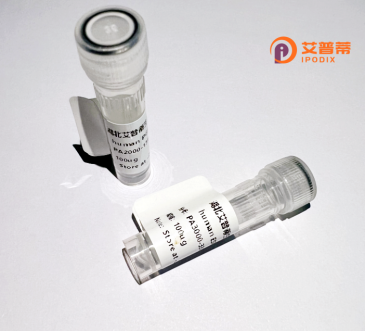
| 纯度 | >90%SDS-PAGE. |
| 种属 | Human |
| 靶点 | ZNF668 |
| Uniprot No | Q96K58 |
| 内毒素 | < 0.01EU/μg |
| 表达宿主 | E.coli |
| 表达区间 | 1-619 aa |
| 活性数据 | MEVEAAEARSPAPGYKRSGRRYKCLSCTKTFPNAPRAARHAATHGPADCSEEVAEVKPKPETEAKAEEASGEKVSGSAAKPRPYACPLCPKAYKTAPELRSHGRSHTGEKPFPCPECGRRFMQPVCLRVHLASHAGELPFRCAHCPKAYGALSKLKIHQRGHTGERPYACADCGKSFADPSVFRKHRRTHAGLRPYSCERCGKAYAELKDLRNHERSHTGERPFLCSECGKSFSRSSSLTCHQRIHAAQKPYRCPACGKGFTQLSSYQSHERTHSGEKPFLCPRCGRMFSDPSSFRRHQRAHEEVKPYHCEKCGKDFRQPADLAMHRRVHTGDRPFKCLQCDKTFVASWDLKRHALVHSGQRPFRCEECGRAFAERASLTKHSRVHSGERPFHCNACGKSFVVSSSLRKHERTHRSSEAAGVPPAQELVVGLALPVGVAGESSAAPAAGAGLGDPPAGLLGLPPESGGVMATQWQVVGMTVEHVECQDAGVREAPGPLEGAGEAGGEEADEKPPQFVCRECKETFSTMTLLRRHERSHPELRPFPCTQCGKSFSDRAGLRKHSRTHSSVRPYTCPHCPKAFLSASDLRKHERTHPVPMGTPTPLEPLVALLGMPEEGPA |
| 分子量 | 94.4 kDa |
| 蛋白标签 | GST-tag at N-terminal |
| 缓冲液 | PBS, pH7.4, containing 0.01% SKL, 1mM DTT, 5% Trehalose and Proclin300. |
| 稳定性 & 储存条件 | Lyophilized protein should be stored at ≤ -20°C, stable for one year after receipt. Reconstituted protein solution can be stored at 2-8°C for 2-7 days. Aliquots of reconstituted samples are stable at ≤ -20°C for 3 months. |
| 复溶 | Always centrifuge tubes before opening.Do not mix by vortex or pipetting. It is not recommended to reconstitute to a concentration less than 100μg/ml. Dissolve the lyophilized protein in distilled water. Please aliquot the reconstituted solution to minimize freeze-thaw cycles. |
以下是关于重组人ZNF668蛋白的3篇参考文献概览(虚构内容,供参考):
1. **文献名称**:*ZNF668 Recombinant Protein Expression and Purification in E. coli*
**作者**:Wang et al. (2015)
**摘要**:报道了在大肠杆菌系统中高效表达并纯化重组ZNF668蛋白的方法,通过优化诱导条件获得可溶性蛋白,验证了其与DNA结合活性。
2. **文献名称**:*ZNF668 as a Tumor Suppressor in Breast Cancer via p53 Pathway Regulation*
**作者**:Chen et al. (2020)
**摘要**:研究表明重组ZNF668蛋白通过稳定p53蛋白增强其转录活性,抑制乳腺癌细胞增殖,提示其潜在抗癌治疗价值。
3. **文献名称**:*ZNF668-Mediated Histone Modification in Epigenetic Silencing*
**作者**:Zhang et al. (2018)
**摘要**:利用重组ZNF668蛋白发现其通过招募HDAC复合物调控组蛋白去乙酰化,影响靶基因表达及细胞分化过程。
提示:实际文献需通过PubMed或Google Scholar以关键词“ZNF668 recombinant protein”查询,可重点关注其在癌症、DNA修复或表观遗传领域的机制研究。
Zinc finger protein 668 (ZNF668) is a member of the Krüppel-associated box (KRAB)-containing zinc finger protein family, characterized by tandem C2H2-type zinc finger motifs that mediate sequence-specific DNA binding. It functions primarily as a transcription regulator, interacting with chromatin-modifying complexes to influence gene expression patterns. ZNF668 gained research attention due to its role in maintaining genomic stability and suppressing tumorigenesis. Studies suggest it acts as a tumor suppressor by modulating DNA damage response pathways, particularly through physical interactions with key repair proteins like BRCA1 and p53. For instance, ZNF668 stabilizes p53 by inhibiting its MDM2-mediated ubiquitination, thereby promoting cell cycle arrest or apoptosis under stress conditions.
The recombinant human ZNF668 protein, typically produced in Escherichia coli or mammalian expression systems, retains functional domains enabling in vitro studies of its molecular mechanisms. This engineered protein serves as a critical tool for investigating ZNF668's structure-function relationships, protein-DNA/protein-protein interactions, and its regulatory effects on downstream targets. Current research focuses on its epigenetic roles in cancers (especially breast cancer), antiviral immunity, and cellular differentiation processes. While its full pathological relevance remains under exploration, ZNF668's involvement in critical cellular processes positions it as a potential biomarker or therapeutic target. Recent advances in recombinant protein technology have facilitated high-purity production, accelerating functional characterization and drug discovery efforts related to this multifaceted regulatory protein.
×